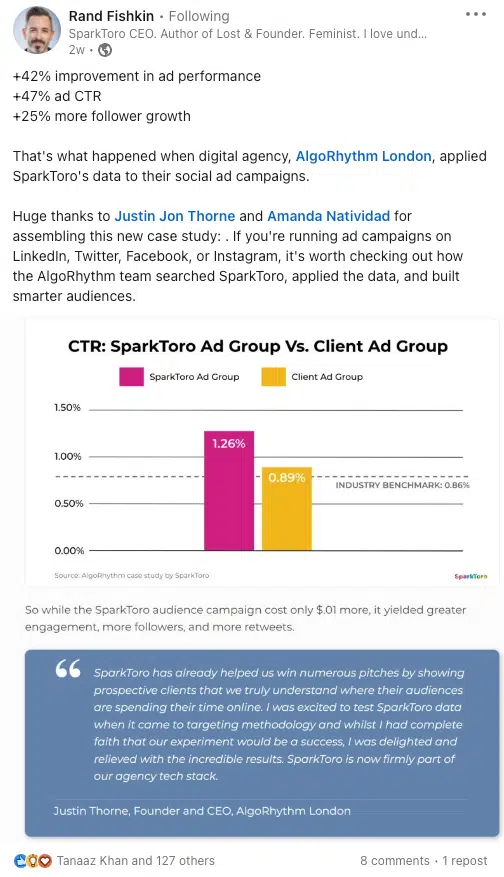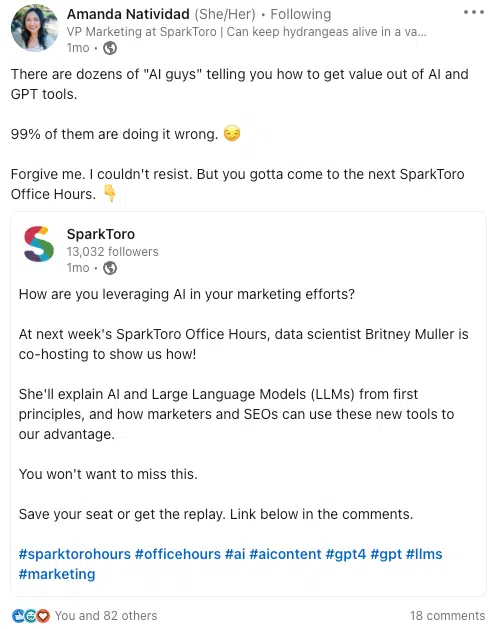
Picture this. You’ve just hit the “publish” button on your company’s latest blog post. A masterpiece, full of trend analyses, punchy insights and actionable takeaways. Once upon a time, you might have sat back, fingers crossed, hoping your precious piece would somehow tumble into the great wide world of cyberspace. But let’s face it — the “publish and pray” era of content marketing is long gone.
Nowadays, waiting for your content to go viral magically is like waiting for a bus in the middle of a desert. But what if there was a way to increase your content’s reach right out of the gate? Enter stage right: the power of an employee advocacy program.
We’re talking about your team, your most loyal supporters, donning the hat of brand ambassadors and spreading the good word about your company on their personal channels. It’s like a shot of adrenaline straight to the heart of your content’s reach and engagement.
Maybe you’re wondering, “Should I be mixing professional content into my colleagues’ personal social media worlds? Is it fair or even feasible?” Well, let’s dive deep to uncover why an employee advocacy program might be the secret sauce your content marketing strategy needs to truly sizzle.
Decoding employee advocacy
Employee advocacy isn’t just a fancy marketing term. It’s the key to turning your team, your work family, into your brand’s cheerleaders, willingly and enthusiastically waving your company’s banner.
Like customer brand advocates, you can empower your employees to be a conduit for brand messaging, taking company-related content and stories into their personal networks and effectively turning them into genuine brand ambassadors.
Let’s take a step back and consider who your employees really are. They are more than just cubicles in an office or names in an email thread. They are the lifeblood of your company, the bearers of its authentic voice and often its most credible evangelists.
In the crowded social media landscape, where everyone is vying for attention, your employees’ voices have the power to cut through the noise. Their endorsement of your brand, being deeply personal and sincere, can add a spark to your reputation, boost your visibility and widen your reach like never before.
Dig deeper: 6 tips for optimizing LinkedIn content for B2B marketing
Unlocking the potential of employee advocacy in content marketing
Look at your employees’ personal networks as an untapped reservoir of opportunities. Each Facebook friend, LinkedIn connection or Instagram follower your employees have is a potential audience member for your content. When these connections are pooled together, your content’s reach could multiply exponentially.
What makes these networks even more powerful is the nature of personal relationships that underpin them. These are not faceless masses but real people who engage more readily because they trust the source of the content.
In an age where skepticism is the default setting for many internet users, the personal endorsement of employees can lend much-needed authenticity and credibility to your brand. People trust their peers and their friends. When your content is shared by someone they trust, they are more likely to engage with it and more likely to place their trust in your brand.
It’s word-of-mouth marketing, supercharged for the digital age. In a nutshell, that’s the power and potential of employee advocacy in content marketing.
Navigating the hurdles of implementing an employee advocacy program
Some of the most effective marketing strategies are often avoided because they are accompanied by challenges that take time and effort to address. Some of these hurdles include:
Harmonizing personal and professional boundaries
Walking the tightrope between personal and professional spaces is one of the major challenges when introducing an employee advocacy program. Ensuring employees don’t feel pressured to blend their personal social media profiles with professional obligations is a delicate task. It is vital to create an environment of transparency, mutual respect and clarity about the program’s expectations and boundaries.
Educating and inspiring your workforce
Your employees are the linchpin of the advocacy program. For it to work, they need to understand not just the mechanics of it but the spirit behind it.
This involves regular training sessions to familiarize them with the process, along with clear communication about why their involvement matters. Motivation can be infused through the clever use of rewards, recognition, or gamification techniques to create a sense of competition and excitement.
Preserving brand consistency across individual voices
An employee advocacy program unleashes a chorus of individual voices for your brand, but the core brand message must remain clear and consistent amid this symphony.
This can be achieved by providing employees with guidelines, content templates and pre-approved content that ensures the essence of your brand remains undiluted.
Integrating an employee advocacy program into your content marketing strategy: A step-by-step approach
Let’s crack the code on how to weave an employee advocacy program seamlessly into your existing content marketing strategy, one step at a time.
Step 1: Find the right brand ambassadors within your team
While the entire workforce can be a part of the advocacy program, it’s prudent to focus on those who show a higher degree of engagement, possess a robust social network and align well with your brand values. These individuals are likely to be your brand’s most effective advocates and influencers.
Step 2: Empower your advocates with the right tools and guidance
Once your potential advocates are identified, the next step is to arm them with the resources they need to be effective. This includes clear guidelines on what, when and how to share and the tools that can simplify the sharing process. Many businesses leverage employee advocacy platforms for this purpose, which can help streamline and monitor the process.
Step 3: Assess performance and refine your approach
Finally, as with any marketing strategy, it’s crucial to keep a close eye on the performance of your advocacy program. Monitor metrics like engagement, reach, lead generation, conversions, etc., to understand what’s working and what isn’t. Be ready to adjust your tactics based on these insights, continually refining your approach for maximum effectiveness.
Examples of successful employee advocacy programs
We’ve discussed the concept of employee advocacy, but how does it look in the real world? Here are a few examples of companies that have taken the employee advocacy route and are absolutely nailing it.
Shopify
Shopify is a standout example when it comes to stellar employee advocacy. They’ve mastered the art of tapping into the content-creating potential of their employees, right from the entry-level up to the executive suites.
They’re doing it all — from featuring employees on the company page and showcasing their expertise through employee-penned blogs to re-sharing thought-provoking content from their high-level execs.

And the cherry on top? This approach serves as a win-win. It helps employees boost their personal brands and gain recognition, all while reaping the benefits of being an advocate.
Plus, it’s a content goldmine for Shopify, keeping their content calendar buzzing with fresh, engaging material.
SparkToro
When it comes to leveraging the power of employee advocacy, SparkToro hits it out of the park. The secret to their success? Their dynamic duo, Rand Fishkin and Amanda Natividad.
Fishkin, a well-known figure in the marketing world, is particularly effective at stirring up engaging conversations around SparkToro on his personal social channels. His charisma and authority in the field pull in high engagement and the trust he’s cultivated among his followers often translates into interest for SparkToro.

And then there’s Natividad, Head of Growth, who regularly shares SparkToro news and insights across her networks. Her posts offer a valuable mix of expert knowledge and personal touch, creating content that is relatable, engaging and always uniquely SparkToro.

The magic in SparkToro’s approach is the authenticity it brings. Fishkin and Natividad’s advocacy efforts feel natural as they intertwine their personal brand with SparkToro’s story.
As they boost their own professional visibility, they’re also continuously stoking the SparkToro flame, proving once again how employee advocacy can be a win-win situation.
Assessing the fit: Is employee advocacy right for your business?
Now that you know why creating an employee advocacy program is effective, setting it up should be simple, right? Let’s be honest; it isn’t a walk in the park.
It comes with its own share of hurdles, from respecting personal-professional boundaries and investing in comprehensive training to maintaining consistency in brand messaging. It’s a balancing act; not every organization may be ready for it.
To gauge if your business is cut out for an employee advocacy program, it’s crucial to ask some hard-hitting questions:
- Is your company culture a fertile ground for advocacy? Is there a sense of engagement and enthusiasm among employees that can be channeled into advocacy?
- Do your employees have robust personal networks that can be leveraged? Remember, the strength of your advocacy program is directly proportional to the reach of your employees’ networks.
- Are you in a position to provide the necessary resources and support for implementing the program effectively?
As marketers, our jobs often involve making strategic decisions that could pivot the business in new directions. Deciding on an employee advocacy program is one such decision that shouldn’t be taken lightly. It’s about more than just sharing company news on personal social feeds — it’s about building a brand together.
Take your time, weigh the pros and cons and make the decision that’s right for your brand. And remember, every step you take towards better brand engagement is a step in the right direction.
Get MarTech! Daily. Free. In your inbox.
Opinions expressed in this article are those of the guest author and not necessarily MarTech. Staff authors are listed here.




